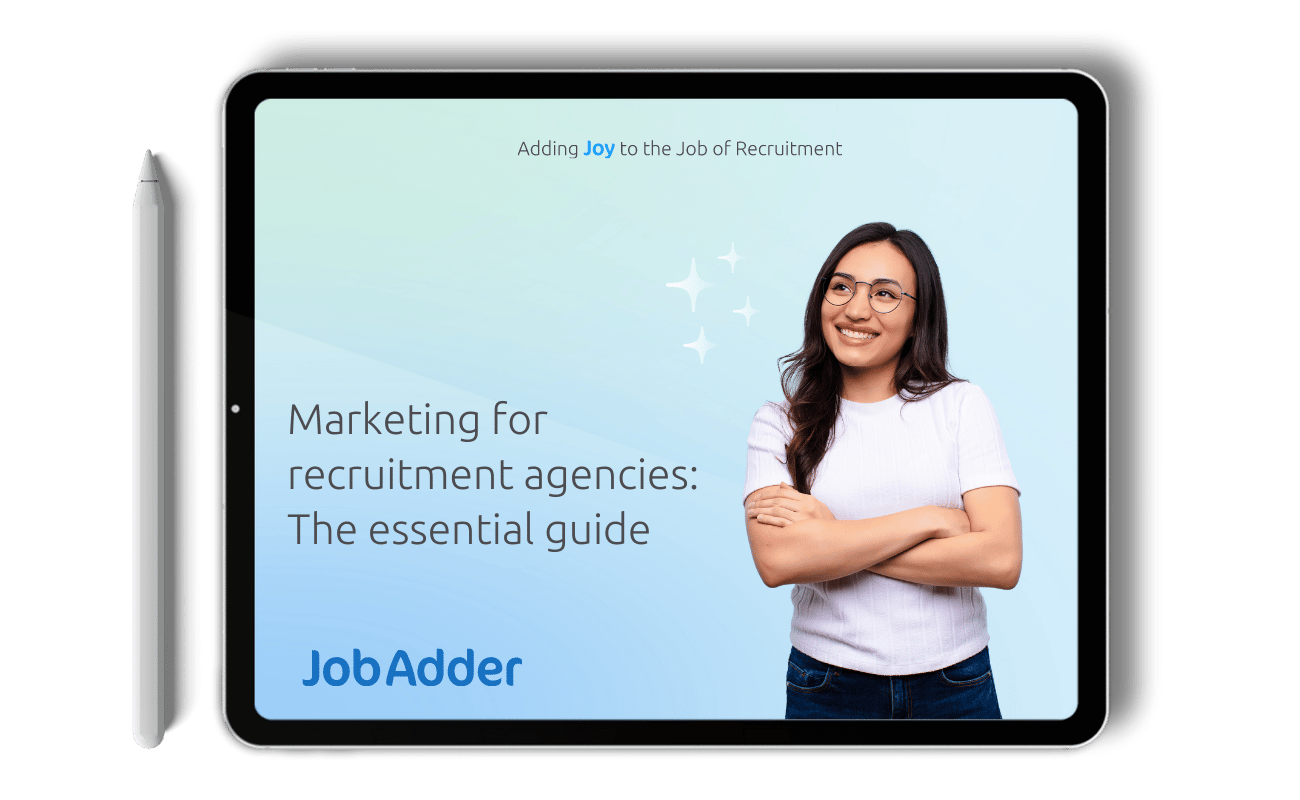Recruitment Blog
Social media recruiting: How to effectively attract top talent to your agency

The evolution of the digital landscape has undeniably impacted various aspects of our lives, including how we approach the recruitment process.
Social media has become an indispensable tool for recruiters, helping them streamline the hiring process, cut recruiting costs and reach out to a broader pool of potential candidates.
Using social media in recruitment enhances the chances of placing the right candidate in the proper role, often outperforming traditional recruiting methods.
We’ll explore the transformative power of social media for recruitment, illustrating the numerous ways it can bolster your recruitment strategy, provide valuable insights and establish meaningful connections with top talent across various industries.
DOWNLOAD THE EBOOK: Marketing for recruitment agencies: The essential guide
Why recruiting with social media works
In the contemporary job market, job seekers, including high-quality candidates, leverage every platform to find the best opportunities. These platforms include traditional job boards, professional networking events and social media.
Traditional recruiting methods are evolving, and social media has emerged as a formidable force in professional networking.
Social media recruiting works for several reasons. It taps into a larger talent pool, grants access to many potential candidates from diverse backgrounds and locales and enables increased candidate engagement.
Recruiters can engage candidates more effectively, fostering solid relationships from the get-go. Social media platforms are great avenues for referrals. Current employees, customers and followers can share job postings, amplifying your reach. We’ll discuss how best to utilise them in your recruitment strategy below.
Wider talent pool
One of the significant advantages of social media recruiting is the ability to access a wider talent pool. Unlike traditional recruitment methods that can often be geographically limiting or restricted to a specific network, social media channels present recruiters with a global platform to promote job openings.
By sharing open positions on these networks, recruiters can reach potential candidates beyond their immediate network, significantly expanding their talent pool.
Social media also allows recruiters to tap into a pool of passive candidates. These individuals may not actively seek a new job but could be open to new opportunities.
Platforms such as LinkedIn have become essential tools for recruiters, enabling them to build a community of potential candidates. The broader reach of social media ensures that recruiters can find a better match for their job descriptions and effectively widen their candidate sourcing net.
Improve candidate engagement
Social media is a powerful tool for improving candidate engagement. It allows recruiters to proactively reach out to passive candidates through their social media profiles, showcasing relevant job opportunities and creating interest in potential new roles. This can involve anything from direct messages to comments on posts.
By leveraging social media platforms, recruiters can create interactive and engaging content that captures the attention of job seekers. This could be anything from behind-the-scenes videos and employee testimonials to live Q&A sessions about job openings, fostering excitement and curiosity about potential career opportunities.
Through the strategic use of social media for recruitment, recruiters can foster meaningful connections with candidates and provide valuable insights into their clients, roles and candidate care.
Create a network of qualified candidates
Social media also plays a pivotal role in creating a network of qualified candidates. Recruiters can leverage social media to expand and nurture their professional networks, connecting with diverse job candidates.
With the power of advanced search features and hashtags, you can strategically target your recruiting efforts on social media platforms to engage with potential candidates that align with your target audience.
Moreover, the interactive nature of social media allows you to establish and cultivate relationships with candidates, creating a sense of community and belonging even before a potential candidate enters your recruitment pipeline.
Showcase the client’s brand
Recruiters can also leverage social media to showcase and enhance their clients’ employer brands. The extensive reach of social media means you can strategically position your clients’ brands and make the most of any existing brand awareness in the market to attract candidates.
This provides potential candidates with insights into the company’s culture, values and work environment, factors that are becoming increasingly important to candidates.
Authentic stories, testimonials and visuals are powerful tools for highlighting an employer’s brand and company culture. Recruiters can attract candidates who resonate with the brand, increasing the likelihood of finding the right fit for open positions.
Get referrals from previous candidates and current employees
Social platforms have become a powerful tool for obtaining valuable referrals from previous candidates and current employees. By fostering relationships with candidates placed successfully in the past and maintaining a rapport with current employees, recruiters can effectively utilise their network for quality referrals.
An active presence and engagement on social platforms also allow recruiters to stay top of mind with their connections. When a position that matches your friends or acquaintances opens up, your connections are more likely to refer them, helping you attract top talent through trusted referrals.
This amplifies the reach of recruitment efforts and results in high-quality leads, as referrals often come from individuals who understand the job requirements and company culture.
Save on recruiting costs
Social media recruiting also offers financial benefits. Traditional recruiting methods, such as job board postings or paid online listings, often come at a cost. In contrast, social media platforms can provide a cost-effective solution for recruitment.
If you want to share a job ad with your social network and expand its reach, simply promote it through organic social media posts (i.e. directly to your feed).
Best practices for recruiting with social media platforms
Recruitment agencies must adopt best practices and innovative strategies to find and hire qualified candidates via social media platforms. Simply posting job descriptions to a careers page isn’t effective in today’s competitive landscape.
Recruiters must approach social media strategically to excel and attract suitable candidates. These best practices will help elevate your social media recruiting game and attract top talent to your agency.
Define specific criteria for your ideal candidate
One of the foremost strategies is defining specific criteria for your ideal candidate. This will significantly enhance the use of advanced search features on social media platforms, allowing recruiters to effectively narrow the pool of potential job applicants to those who closely align with their desired qualifications and skills.
With clear, targeted job opportunities that resonate with candidates, recruiters can attract top-tier talent. Additionally, a well-defined candidate profile helps sift through many job applicants on social media.
Build a strong social media presence outside of job postings
Developing a robust social media presence beyond job postings is paramount for recruitment agencies.
This broadened presence showcases your expertise, industry knowledge and unique value proposition, appealing to clients and potential candidates. Sharing relevant, engaging content solidifies your standing as a trusted advisor, demonstrating a keen understanding of the market and a capability to connect top talent with ideal opportunities.
Active engagement in industry discussions and prompt responses to inquiries on social media platforms fosters meaningful relationships with clients and candidates.
Make sure your job posting is compelling
An integral part of a successful social media recruiting strategy is the creation of compelling job postings. Writing a winning job ad can help you effectively target and engage your desired demographic of potential candidates, ensuring you attract the right individuals.
The job ad should clearly outline the role’s responsibilities and qualifications while highlighting its unique selling points. This forms a compelling narrative that resonates with job seekers exploring new opportunities.
Collect the hiring metrics you need
Tracking metrics such as engagement levels, reach and click-through rates on social media platforms allow for an accurate assessment of the impact and ROI of your social media recruiting campaigns.
This empowers your agency to make data-driven recruitment decisions, continually improving and optimising your social media recruitment efforts.
Implementing social media into your current recruitment process
Social media recruitment strategies can be easily integrated into your current recruitment process, resulting in a more streamlined and efficient approach to sourcing and engaging potential candidates.
Modern recruitment software is designed to seamlessly integrate with various social media platforms, providing a streamlined, seamless experience. Automated job posting features in these software tools enable recruiters to share job openings across their social media networks with just one click.
Additionally, managing candidate interactions from a centralised platform enhances recruiters’ ability to track, engage and follow up with potential candidates. It also facilitates the measurement of social media campaign effectiveness, allowing recruiters to track critical metrics and gain valuable insights for optimisation.
Social media recruiting FAQs
Still, have questions about whether to use social media for recruiting? Here are the top answers to your questions…
What social media platforms work best for recruiters?
LinkedIn often stands out as the preferred platform for recruiters due to its professional focus, extensive user base and advanced search capabilities, making it particularly conducive to identifying and engaging with potential candidates.
Other platforms such as Facebook, Instagram, TikTok and Twitter can also serve as tools to showcase employer branding, share job postings and answer queries. The social media channel you choose will depend on your target demographic and industry.
Can both recruitment agencies and in-house hiring managers leverage social media recruitment tactics?
Recruitment agencies and in-house talent acquisition professionals can effectively leverage social media recruitment tactics. Regardless of the recruitment structure, social media offers a cost-efficient and time-saving means to reach a larger pool of candidates.
It provides an accessible platform to showcase job opportunities, cultivate an appealing employer brand and build relationships with potential hires, enhancing overall recruitment success.
How can social media recruiting strategies work with recruitment software to improve the hiring process?
When integrated with recruitment software, social media recruiting strategies can dramatically enhance the efficiency and effectiveness of the hiring process. The use of recruitment software allows for the automation of job postings on various social media platforms, centralised tracking of candidate engagement and efficient management of the entire recruitment workflow.
Moreover, the analytical capabilities of recruitment software enable recruiters to measure the success of their social media campaigns and make data-driven adjustments to their strategies, leading to more optimised recruitment efforts.
Want to learn more about social media recruitment, marketing automation and other recruitment marketing best practices? Download our free eBook: Marketing for recruitment agencies: The essential guide.
Marketing your recruitment agency doesn’t have to be a struggle. Read our handy guide.

Related blog posts

To excel in the competition for top talent, proactive workforce planning is essential. Traditional methods struggle to adapt to evolving …
Ready to get started?
Talk to one of our friendly team members


